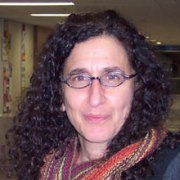| Fresh Blood: a Consideration of Belonging |
|
Documentaire. Canada. 1996. Couleur. 55'. VO/ST. Distr. : Canadian Filmmakers Distribution Centre (CFMDC)
|
| |
Rien n'est pris pour acquis dans cette réflexion subtile et sensuelle sur l'identité et l'allégeance. L'artiste torontoise b.h. Yael retourne en Israël, où elle est née, pour rencontrer son père biologique, renouer avec sa grand-mère juive irakienne et trouver des réponses à certaines questions. A travers des conversations avec des militants et intellectuels israéliens et palestiniens, et l'exploration de sites symboliques telles les ruines de Sodome, Yael rend compte des interrelations entre les questions de race, de nationalité, de genre et de sexualité.
"Fresh Blood" is a hybrid documentary blending personal narrative and a video-essay style. The piece engages issues of Jewish racialized identity, Arab/Jewish dichotomies and the ways these come together in Iraqi Jewish culture, and the personal implications of the politics of Palestine and of the Jewish holocaust. The artist returns to a land of remembering and forgetting. With her first language lost it is difficult to communicate with her grandmother, and yet there is humour and poignancy in their resulting exchanges. In seeking out her biological father, Yael questions the significance of blood relations. She revisits and revises family memory and myth.
|
|
 |
|
 |
|
b.h. Yael |
|
b.h.Yael décline le thème des rôles de la femme et/ou de la mère en installations, vidéos (My Mother Is A Dangerous Woman), et films (Is Dad Dead Yet). Elle est membre du collectif Spontaneous Combustion, enseigne à l'Ontario College, et participe à l'organisation de festivals de films.
b.h. Yael is a Toronto based filmmaker, video and installation artist. She is Professor and Chair of Integrated Media at the Ontario College of Art and Design, and past Assistant Dean in the Faculty of Art. Yael's work has exhibited nationally and internationally and has shown in various settings, from festivals to galleries to various educational venues. Her work has also been purchased by several universities. Yael's film and video work has dealt with issues of identity, authority and family structures, while at the same time addressing the fragmentary nature of memory and belonging. More recent work focuses on activist initiatives, political fear, apocalypse and gender. The work most often involves non-linear and hybrid forms, including dramatized and fictional elements combined with first person narration, autobiographical and documentary perspectives.
|
|